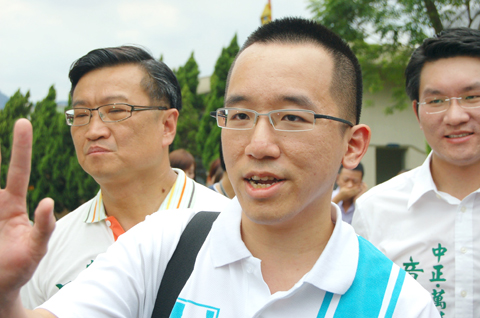The US is seeking to take over two properties in New York and Virginia owned by former president Chen Shui-bian (陳水扁) and his wife.
The US Justice Department filed complaints on Wednesday in New York and Virginia alleging part of US$6 million paid in bribes to Chen’s wife, Wu Shu-jen (吳淑珍), was used to purchase an apartment in Manhattan and a house in Keswick, Virginia. The complaints state that Yuanta Securities Co (元大證券) paid a bribe to ensure its bid to acquire additional shares in Fuhwa Financial Holding Co (復華金控) would not be blocked by authorities.
“A portion of these bribe proceeds were then transferred ... to the United States and used to purchase a condominium in Manhattan” and a house in Virginia, the complaints allege.

PHOTO: CNA
Chen and Wu were convicted last year of embezzling state funds, accepting bribes and money laundering, and sentenced to life in prison. The sentences were reduced to 20 years by an appeals court on June 11, although that verdict is being appealed by prosecutors.
Homeland Security Director for Immigration and Customs Enforcement John Morton said the complaints reflect the US’ determination not to allow itself to be abused by corrupt foreign officials.
“This serves as a warning to those ... officials who abuse their power for personal financial gain and then attempt to place those funds in the US financial system,” he said.
Chen was perplexed by the US request and urged the US judiciary to await the final court ruling on the “case of the second financial reform” before taking any action, the couple’s son, Chen Chih-chung (陳致中), said yesterday after visiting his father at the Taipei Detention Center in Tucheng (土城), Taipei County.
The former president was referring to the prosecutors’ allegation that he and his wife accepted bribes from banks in 2007 to “smooth” requirements at the time the government was implementing a second phase of financial reforms to encourage monetary institutions to merge.
Chen Chih-chung said he did not understand the US government’s “leap in thinking.”
“Maybe the US government did not have sufficient information before it made the decision,” he said. “Such a decision was arbitrary.”
Chen Chih-chung said he suspects the US government made the request based on the “second financial reform case.”
However, before Taipei District Court hands down its verdict in that case, the US could not be sure if the money used to buy the properties was dirty, he said.
The Presidential Office and the American Institute in Taiwan (AIT) both declined to comment yesterday. Presidential Office Spokesman Lo Chih-chiang (羅智強) said President Ma Ying-jeou (馬英九) would not intervene in an ongoing case.
“This is a case where Department of Justice is working with Taiwan authorities ... I cannot comment on the specifics of an ongoing case,” AIT spokesperson Sheila Pasksman said.
Meanwhile, Ministry of Foreign Affairs Spokesman Henry Chen (陳銘政) said the ministry respected the US judicial process and would provide any information the US requested, although it would not volunteer such information.
ADDITIONAL REPORTING BY SHIH HSIU-CHUAN

CHAOS: Iranians took to the streets playing celebratory music after reports of Khamenei’s death on Saturday, while mourners also gathered in Tehran yesterday Iranian Supreme Leader Ayatollah Ali Khamenei was killed in a major attack on Iran launched by Israel and the US, throwing the future of the Islamic republic into doubt and raising the risk of regional instability. Iranian state television and the state-run IRNA news agency announced the 86-year-old’s death early yesterday. US President Donald Trump said it gave Iranians their “greatest chance” to “take back” their country. The announcements came after a joint US and Israeli aerial bombardment that targeted Iranian military and governmental sites. Trump said the “heavy and pinpoint bombing” would continue through the week or as long

TRUST: The KMT said it respected the US’ timing and considerations, and hoped it would continue to honor its commitments to helping Taiwan bolster its defenses and deterrence US President Donald Trump is delaying a multibillion-dollar arms sale to Taiwan to ensure his visit to Beijing is successful, a New York Times report said. The weapons sales package has stalled in the US Department of State, the report said, citing US officials it did not identify. The White House has told agencies not to push forward ahead of Trump’s meeting with Chinese President Xi Jinping (習近平), it said. The two last month held a phone call to discuss trade and geopolitical flashpoints ahead of the summit. Xi raised the Taiwan issue and urged the US to handle arms sales to

State-run CPC Corp, Taiwan (CPC, 台灣中油) yesterday said that it had confirmed on Saturday night with its liquefied natural gas (LNG) and crude oil suppliers that shipments are proceeding as scheduled and that domestic supplies remain unaffected. The CPC yesterday announced the gasoline and diesel prices will rise by NT$0.2 and NT$0.4 per liter, respectively, starting Monday, citing Middle East tensions and blizzards in the eastern United States. CPC also iterated it has been reducing the proportion of crude oil imports from the Middle East and diversifying its supply sources in the past few years in response to geopolitical risks, expanding

Pro-democracy media tycoon Jimmy Lai’s (黎智英) fraud conviction and prison sentence were yesterday overturned by a Hong Kong court, in a surprise legal decision that comes soon after Lai was jailed for 20 years on a separate national security charge. Judges Jeremy Poon (潘兆初), Anthea Pang (彭寶琴) and Derek Pang (彭偉昌) said in the judgement that they allowed the appeal from Lai, and another defendant in the case, to proceed, as a lower court judge had “erred.” “The Court of Appeal gave them leave to appeal against their conviction, allowed their appeals, quashed the convictions and set aside the sentences,” the judges